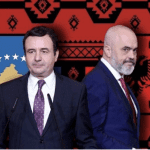By Janusz Bugajski
As the moment of truth approaches for Kosova, it is time to look at the impact that international decisions will have for the future of the Balkans. In sum, the U.S. and the EU will need to balance the potential instabilities arising from Kosova’s final status.
UN special envoy Martti Ahtisaari is presenting his report on Kosova to the Contact Group. His likely solution will be “supervised independence,” whereby NATO and the EU will control Kosova’s security and international relations while Prishtina will assume most other governmental functions.
Ahtisaari’s proposal is likely to separate independence from sovereignty, in that Kosova may not be afforded full statehood and will not automatically gain a UN seat. The calculation is that Russia will approve if sovereignty is not made explicit. The UN Security Council will not pass a resolution to recognize Kosova as a sovereign state but will leave such decisions to individual countries.
Supervised independence with precise roles for NATO and the EU, will be acceptable to most Kosovars. However, international recognition as a sovereign state remains the key variable. Without the prospect of statehood, the possibility of instability in Kosova may escalate.
The U.S. will probably act with like-minded allies to formally recognize Kosova as a sovereign state. Other powers would then follow suit, including most EU members and the Muslim world. Russia would be unable to extract significant advantages by further postponing Kosova’s statehood.
The biggest question for the Balkans is which scenario will prove more destabilizing: Kosova’s independence and sovereignty or its maintenance as a non-sovereign entity. In sum, which is the more dangerous prospect: a Greater Serbia or a pan-Albania?
Following international acceptance of Kosova’s statehood, Belgrade will vehemently complain but its case will be weakened by several factors. Serbia lost Kosova seven years ago when NATO intervened to prevent the genocide of the Albanian majority by the Milosevic regime. A state that planned to murder and expel its own citizens and lost a war in the process is not entitled to keep former victims and their territory within its borders.
The international recognition of Kosova will simply ensure de jure what has existed de facto since 1999 under a UN and NATO umbrella. Moreover, the Kosovar population is entitled to have their status defined and secured so democratic construction and economic development can proceed with the prospect of eventual EU and NATO entry.
Serbia can no longer launch military attacks or use nationalist militias against its neighbors. Cutting off relations with major European states will be counter-productive for Belgrade. It would further retard Serbia’s EU and NATO prospects, undermine relations with immediate neighbors, and create a rift with Washington, which has been highly supportive of Serbia’s international integration.
A second scenario, in which Kosova’s statehood is denied, will prove more threatening to regional security. The credibility of political institutions in Prishtina that the U.S. and the EU have spent years constructing would evaporate as public frustration and political radicalism would delegitimize the government and provide new opportunities for irredentist militants.
Extremism in Kosova could destabilize several neighboring states. Continuing ambiguity over statehood would discredit democrats and encourage radicals to undermine Macedonia, Montenegro, and Serbia by launching new guerrilla movements, challenging the integrity of state borders, and provoking inter-ethnic conflicts.
The credibility of international institutions would be sorely tested by a new Balkan insurgency. NATO’s military presence, which has been steadily scaled down, would need to be reinforced and the U.S. and its allies could be faced with a major foreign policy failure if any Balkan state begins to unravel. Years of political and economic investment would be wasted and anti-Western groups could exploit the crisis to undermine trans-Atlantic unity and European stability.
Given a choice between statehood with institutional supervision on the one hand, and state failure with regional conflict on the other, there is only one realistic option for Kosova’s final status.
Kosova After Final Status

Change font size:









